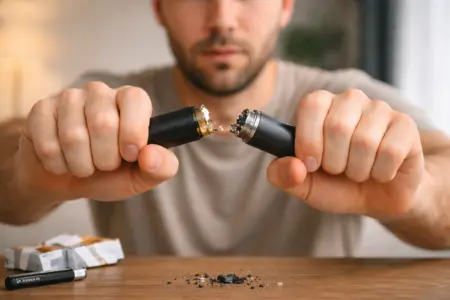As a woman suffering from addiction, the impact of alcohol and drug use resonates differently compared to your male counterparts. Gender differences make your journey through addiction filled with unique challenges, from the fact that you’re more prone to addiction to the difficulties you encounter in recovery. For this and many other reasons, men and women dealing with substance use disorders will have a completely different journey on the route to recovery.
Your experience with addiction is influenced by various factors. These include how your body processes substances, societal expectations, and your circumstances. These elements shape a journey that’s different for you.
Throughout your recovery journey, you will encounter unique challenges. These obstacles arise from stigma, balancing family responsibilities, and specific emotional triggers during recovery. However, tailored support and strategies can help address these challenges as you pursue a better, healthier and sober life.

Download Our Brochure
Understanding Alcohol and Drug Addiction in Women
In dealing with substance misuse, psychologically, you might face emotional trauma, anxiety, or depression, contributing to addictive behaviours. Socially, societal pressures, gender roles, and cultural influences affect your experience. And of course, biological differences, including hormonal fluctuations, will impact how addiction develops and progresses in your body.
Physiologically, men and women have different responses to how substances impact their body. Sex hormones might heighten your sensitivity to substances, leading to different cardiovascular and neurological effects compared to men. Substance misuse might bring health issues related to your menstrual cycle, hormones, pregnancy, breastfeeding, fertility, or menopause.
In addition, when dealing with addiction, you encounter triggers specific to your gender. These include societal stigmas, pressures from family or caregiving roles, and complexities in social relationships during recovery. Furthermore, emotional triggers related to self-esteem, body image, or past traumas such as sexual abuse can make things more difficult.
The Six Challenges Women Suffering from Addiction Experience
Navigating addiction and recovery as a woman brings unique challenges, as the journey impacts various aspects of your life. Understanding these hurdles and finding the right support are pivotal steps toward conquering addiction and ensuring a lasting recovery.

1. Accelerated Addiction Development
Men and women metabolise drugs and alcohol differently. Biologically, women tend to have fewer enzymes to break down substances and, regardless of weight, a higher ratio of body fat, meaning some of those substances will linger in the body longer and have a more significant impact on your well-being.
This increased vulnerability not only leads to potential physical and mental health repercussions but also accelerates the development of addiction. For this reason, seeking support at an earlier stage is notably more important for women in recovery.
2. Social Stigma
Women seeking treatment for substance use disorder have a harder time navigating things due to societal expectations and stigma. You may feel the weight of cultural norms, making it tough to admit struggles without fearing judgment for falling short of certain standards expected from a mother, wife, or employee, for example.
Ideals surrounding femininity and body image can also intensify anxiety about seeking help. The expectations placed on women, especially pregnant women or mothers, often leave little room for you to acknowledge personal challenges such as drug or alcohol misuse.

Further complicating matters are childcare responsibilities, past trauma, financial constraints, and the fear of jeopardising your career, all contributing to a reluctance to seek treatment. These combined pressures and barriers create formidable obstacles in your journey towards overcoming alcohol or drug addiction.

3. Dual Diagnosis
Women suffering from addiction often have to deal not just with the challenges of substance misuse but also face a higher probability of underlying mental health issues. Co-occurring disorders such as depression and anxiety disorders, or more serious psychological problems such as borderline personality disorder, post-traumatic stress disorder, bipolar disorder, and eating disorders commonly coexist with addiction, complicating the recovery process.
The continued use of alcohol and illicit substances might exacerbate these mental health concerns, intensifying symptoms and triggering riskier behaviours. Substance misuse can also inadvertently serve as a means to cope with underlying psychological struggles, creating a harmful cycle that can escalate both addiction and women’s health issues.
In addition, the intertwined nature of addiction and mental health can increase vulnerability to traumatic events. And ongoing drug or alcohol misuse might lead to engaging in riskier behaviours. These layered challenges call for a comprehensive and tailored approach to address both psychological and substance misuse issues for a more effective recovery process.
4. Downplaying an Addiction
Women tend to underestimate or disregard the warning signs due to feelings of fear or shame. These emotions can make you overlook the severity of the problem or deny its existence altogether.

The fear of judgment or the stigma associated with addiction may lead you to rationalise the symptoms, attributing them to something temporary or unrelated. For example, you might have noticed that you’re drinking more than usual but brush it off as just having a stressful week.
Unfortunately, dismissing these early signs can have severe consequences. Continued substance misuse while disregarding these warning signals heightens the risk of significant health implications. For instance, excessive alcohol or substances can lead to health consequences such as liver damage, brain damage, heart disease, breast cancer, and issues with reproductive health.
These health complications not only impact your physical well-being but also have profound consequences on your mental health, potentially leading to long-term consequences that are harder to reverse with time.

5. Higher Risk of Relapse
Relapse is more common for women than men, as women often face specific challenges that can increase the chance of relapse. One significant risk factor is the emotional triggers that you encounter during recovery. Unlike your male counterparts, you might find yourself more vulnerable to relapse due to triggers from negative emotions or personal conflicts.
This vulnerability to relapse amid negative emotions highlights the importance of managing and understanding these feelings throughout your recovery journey. The emotional complexity you experience, coupled with societal pressures and varied responsibilities, can magnify your risk of relapse. Hence, building strong emotional regulation skills and employing healthy coping strategies become crucial aspects of sustaining sobriety.
To mitigate the risk of relapse, identifying and avoiding triggers, seeking support, and engaging in self-care practices are essential. Recognising these challenges and proactively addressing them can significantly empower you in your journey towards a sustained recovery.
6. Finding the Right Supportive Relationships
Finding the right support during your recovery journey is crucial, but as a woman, it can be challenging. Despite enjoying more extensive social networks compared to men, the quality of peer support women receive may not always align with their recovery needs.

Maintaining relationships that don’t prioritise or support your recovery can be a significant hurdle. This is most noticeable in relationships where your intimate partner, friends, or family members continue to engage in substance use or exhibit codependent behaviours despite your pleas for help. This also makes things more difficult for young women who may not yet have had a chance to build proper supportive relationships.
For this reason, seeking support groups and treatment programmes that specifically cater to women’s needs can be highly beneficial. Same-sex social support groups offer a unique space for you to connect with peers who understand your journey and struggles while offering empathetic, non-judgmental support. Women’s groups foster a safe and understanding environment where you can openly share experiences and receive encouragement from those facing similar challenges, which are key to sustaining sobriety.
Approaches to Addiction Treatment for Women
Recovery from addiction presents unique challenges for women, demanding a holistic and gender-specific approach to treatment and support. As a world-renowned residential rehab centre, Castle Craig recognises and addresses the many hurdles you face in seeking and accessing treatment, and provides comprehensive care that honours your individual needs and experiences when undergoing addiction recovery.
Treatment Services and Therapy for Women
Specialised therapy and support groups exclusively for women foster open discussions, providing a safe space to address unique gender-specific challenges. These sessions focus on societal pressures, body image issues, family relationships, and trauma from situations such as domestic violence or sexual assault. At Castle Craig, we offer women’s group therapy which provides a safe space for you to open up, encouraging mutual understanding, solidarity, and empowerment.
Many women often battle addiction alongside an underlying mental health disorder. Castle Craig’s comprehensive approach combines addiction treatment with mental health services, addressing co-occurring disorders. Our many complementary therapies aim to nurture mental well-being while aiding your recovery.
Tailoring strategies for women during recovery involves addressing societal expectations, trauma, parental responsibilities, and financial constraints that you will likely face after leaving rehab. As part of our aftercare programme, we focus on providing you with the necessary coping mechanisms and life skills to navigate these challenges, empowering you to sustain a sober lifestyle.

Step into a Brighter Future
Residential Rehab for Women
We also welcome you to stay at Serenity House, an exclusive women’s residential unit managed by a dedicated female staff. This haven, designed for women, ensures comfort and support throughout your recovery journey.
If you choose to stay with us, accommodations in Serenity House can be arranged during admission, providing an optimal setting for alongside other women in recovery. Access to exclusive on-site facilities, such as a fully equipped gym for exercise and wellness activities, sprawling grounds for peaceful walks, and thoughtfully curated, nutritious meals and snacks, all contribute to a balanced diet crucial for your recovery journey.

Our Aftercare Programme for Women in Recovery
Understandably, transitioning back into your daily routine after rehab poses significant challenges, but at Castle Craig, we ensure your journey doesn’t end upon leaving. Our aftercare program extends substantial support to you beyond residential treatment. Before your residential treatment ends, we tailor a plan to suit your needs, connecting you with local meetings, therapists, and an online support group.
Beyond therapeutic assistance, we will also offer help with practical matters such as accommodation or job search. Our team remains accessible post-rehab, regularly checking in to provide ongoing support and address any emerging needs. At Castle Craig, our commitment goes beyond treatment — your path towards a fulfilling, sober life is our priority.
We’re Here For You
Castle Craig stands committed to offering specialised care and treatment facilities conducive to women’s recovery from alcohol and drug misuse. For someone embarking on a recovery journey, we want to encourage you to maintain hope and determination and assure ongoing support even beyond the treatment period.
Call us today or send us a message using the contact form below and let us help you transform your life for the better.
References
- https://www.emcdda.europa.eu/publications/mini-guides/
- https://www.ncbi.nlm.nih.gov/pmc/articles/PMC6103317/
- https://www.sciencedirect.com/science/article/
- https://pubmed.ncbi.nlm.nih.gov/8997785/


